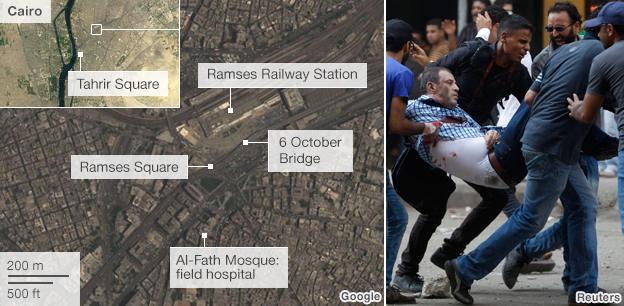Egypt crisis: Tense stand-off at Cairo mosque
- Published
The BBC's Bethany Bell said pictures show people inside the mosque building a make-shift barricade with chairs
Egyptian security forces have surrounded a mosque in the capital, Cairo, amid a stand-off with barricaded Muslim Brotherhood supporters.
Dozens remain, refusing to believe the authorities' pledge of a safe exit.
The tense stand-off follows a day of bloody clashes on Friday in which 173 people died and 1,000 Brotherhood supporters were arrested.
The group has called for daily protests after a crackdown on their camps in Cairo on Wednesday left hundreds dead.
Meanwhile the interim prime minister has proposed legally dissolving the Brotherhood.
The movement is demanding the reinstatement of Mohammed Morsi - Egypt's first democratically elected president - who was removed by the army last month and replaced with an interim government.
Also on Saturday, the Muslim Brotherhood said on its Facebook page that Ammar Badie, the son of the movement's spiritual leader, General Guide Mohamed Badie, was one of those killed during protests on Friday.
Fear for lives
Police have surrounded the al-Fath mosque in Cairo's Ramses Square, where Morsi supporters were holed up.
Security forces had earlier entered the building to try to persuade them to go.
Television pictures showed the security forces in riot gear on the steps outside, with an angry crowd also in attendance.
The security forces did fire into the air to keep the crowd away as some Morsi supporters were escorted from the mosque.
But correspondents say dozens more remain in the main hall, refusing to leave.
BBC Arabic spoke to two of the protesters inside who said that they feared for their lives.
They told the BBC that they did not trust the authorities' promises of a safe exit.
They said there were two bodies inside - one of them of a woman who died after tear gas was fired by police into the mosque overnight and another of a man taken into the building after sustaining bullet wounds.
They said the protesters had drinking water but there was only one toilet.
Among those in the mosque are four Irish citizens - sisters Omaima, Somaia and Fatima Halawa, along with their brother, Ibrihim. Their father is Hussein Halawa, imam of Ireland's largest mosque, in Clonskeagh, Dublin.
Some 1,000 people were trapped in the mosque after violence in Ramses Square on Friday.
Security officials quoted by the official Mena news agency said "armed elements" had opened fire from inside the mosque.
The building quickly filled with dead and injured - as well as those fleeing the violence.
Egypt's interior ministry said in a statement on Saturday that 1,004 "Muslim Brotherhood elements" had been arrested on Friday, 558 of them in Cairo.
UN High Commissioner for Human Rights Navi Pillay said that while peaceful protests and the right to assembly had to be respected, "evidence does point to some of the violent provocation coming from some of the protesters themselves".
"People really need to be reminded to put Egypt first, rather than their different positions," she said.
Meanwhile the Brotherhood said that Ammar Badie, 38, had died of a bullet wound in Ramses Square on Friday.
His father has been charged with inciting violence but his whereabouts are unknown.
The secretary-general of the Brotherhood's Freedom and Justice Party, Mohammed al-Beltagi, says his 17-year-old daughter, Asmaa, died in earlier protests.
'Day of anger'
The Muslim Brotherhood has been on the streets since the army deposed Mr Morsi on 3 July.
On Wednesday at least 638 people died when the Brotherhood's two protest camps in Cairo were cleared, a move that sparked international condemnation.
Friday's protests - dubbed a "day of anger" - were called in response to Wednesday's bloodshed.
The violence erupted shortly after midday prayers when thousands of Morsi supporters answered the Brotherhood's call for rallies across Egypt.
On Saturday, the government updated the casualty figures from the day's violence, putting the number killed across the country at 173, 95 of them in Cairo.
Middle East editor Jeremy Bowen reports from Cairo's Ramses Square - the scene of much of Friday's violence
It added that 1,330 people had been wounded.
The number of police killed since Wednesday was listed as 57, with 563 wounded.
Egypt's interim leaders have imposed a state of emergency, with dusk-to-dawn curfews in the capital and other areas. The interior ministry says police have been authorised to use live ammunition "within a legal framework".
Correspondents say the atmosphere in Cairo is tense, with many armoured personnel carriers deployed on the streets.
The army has blocked off all entrances to Tahrir Square - the focus of demonstrations that led to the toppling of President Hosni Mubarak in 2011.
Meanwhile, groups that support the army-backed interim government - the National Salvation Front and Tamarod - are calling for counter-demonstrations in response to the Muslim Brotherhood protests.
Mr Morsi is now in custody, accused of murder over a 2011 jailbreak. His period of detention was extended by 30 days on Thursday, state media said.
